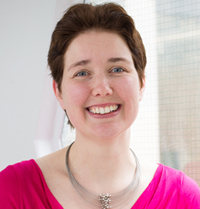In mid-February, nurse researchers, medical oncologists and geriatricians from across Canada flew to Toronto to attend the Treatment Decision-Making in Older Cancer Patients Workshop and Mini-Conference led by Bloomberg Assistant Professor Martine Puts.
“We organized the conference as part of our knowledge synthesis grant from the Canadian Institutes of Health Research, for which I am the principal investigator and Dr. Shabbir Alibhai is the principal knowledge-user,” explained Puts. “The conference was part of our strategy to disseminate our review findings with stakeholders as well as local health-care providers and students. And we wanted other experts to be able to present their latest work on treatment decision-making in older adults.”
Puts and Alibhai, an associate professor with U of T’s Institute of Health Policy, Management and Evaluation, share the same research goal – to improve the health and well-being of older adults. While Puts’s research focuses on geriatric frailty, oncology and treatment decision-making, Alibahai’s research interests include geriatric oncology, age discrimination and cancer-related fatigue.
Joy Richards, BScN 8T1, MN 0T0, helped open the conference by confiding in the difficulties she experienced in navigating the health care system when her mother became ill. The vice-president of health professions and chief nursing executive at University Health Network challenged health care providers not to make assumptions about the care that the elderly want. “We need to find better ways to help the elderly make good choices,” said Richards, who is also a Bloomberg status faculty member.
The presentation
In a systematic review of the reasons why older adults with cancer accept or refuse cancer treatment, Puts found that the deciding factors to be diverse and sometimes surprising. She concluded that the most-important factor for accepting treatment is trust in the physician and the physician’s recommendations. The most-important factors for refusing cancer treatments include a fear of side effects and transportation difficulties.
Other aspects influencing cancer treatment decisions in the elderly are not wanting to become a burden by leaving the illness untreated, and whether they believe friends and family members have had positive treatment and hospital experiences. “Examine the patient’s beliefs about the success of treatment because these beliefs will impact the patient’s treatment decision,” urged Puts. “Discuss the risks and benefits of a treatment so the patient has an accurate understanding. Have a full discussion, including whether the patient has access to transportation and will need financial support, and then organize the resources the patient needs.
“Misconceptions that some older adults have can impact their cancer treatment decisions,” continues Puts. “For example, some older people believe that radiation can cause cancer cells to spread.”
Puts closed by encouraging the researchers at the conference to continue to discover new knowledge about care of the elderly, especially octogenarians. “We need more studies on the older old, on patients in their 80s,” she said.
